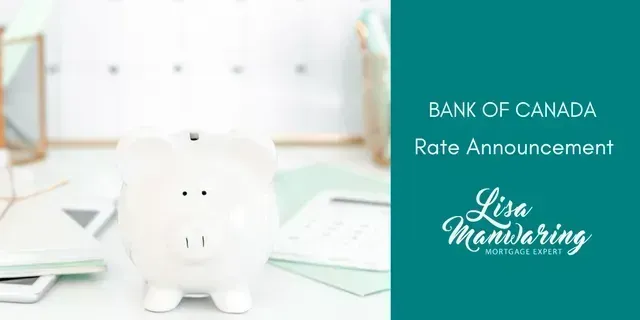Protecting Your Credit Score Through COVID-19
Lisa Manwaring • March 31, 2020

Personal finance is undoubtedly on the minds of most Canadians. For a lot of us, incomes have been reduced, but living expenses remain the same.
The full economic impact of the COVID-19 Pandemic is still uncertain. Unemployment is skyrocketing, people are social distancing, self-isolating, and businesses are struggling to stay afloat. At the writing of this article, over 1 million Canadians have already applied for EI.
However, the federal government has just announced several new programs designed to help those individuals, families, and businesses whose employment has been impacted by COVID-19. If you meet the qualifications for assistance, you should apply.
Now, if you're looking to make sure your credit score isn't hurt during these times, here is some basic advice. The key to managing your credit is to stay on top of your payments. If possible, always make at least the minimum payment on your credit cards and line of credits.
Keep making payments on your instalment loans, car payments and the payments on your mortgage.
If you find yourself getting behind, this isn’t the time to put your head in the sand, instead, make contact with your lenders. Everyone is going through tough times, lenders understand this and have programs in place to help. Chances are, they will be able to reduce your payments, defer your payments, or even consolidate your debts.
Missing payments without communicating with your lender is not an acceptable way to defer payments. This won’t be looked upon favourably and your credit will be damaged as a result.
So, at this very moment, if you’re behind on any of your payments, and you have the means to pay, right now would be a good time to go and make at least the minimum payment. Or to contact your lender and make payment arrangements, communication is everything.
Mortgage lenders have announced their contribution to easing financial stress is to offer mortgage payment deferrals for up to six months. And although this will be an excellent option for some to provide immediate financial relief, it might come with some unforeseen challenges down the line, credit misreporting being one of them.
The truth is, you won’t be penalized for restructuring or deferring your mortgage payments. Still, if your lender’s system isn't correctly adjusted, there’s a good chance something will misreport to the credit agencies and this could lower your credit score. This is true of credit cards, loans, car payments, and mortgage payments.
So, if you do find yourself having to make special arrangements with your lender or you want to defer your mortgage payments, here is a list of things you should consider doing:
- Request written confirmation (email is fine) of the new terms. Get everything in writing. Although it’s probably easiest to call into your bank, things get missed in conversations, having everything in writing is best for you!
- Make sure you record who you have been talking with, along with the date and time of any conversations. Keep minutes for yourself.
- Track your credit score on Equifax and Transunion after the new arrangements are in place.
- If you see any discrepancies, contact your lender immediately, and open a dispute with the credit reporting agencies.
Do your best to keep on top of your payments, make arrangements if you can’t. In time, this will pass. If you’d like to discuss mortgage options, please don’t hesitate to contact me anytime. We’re all in this together!
RECENT POSTS

Bank of Canada maintains policy rate at 2¼%. FOR IMMEDIATE RELEASE Media Relations Ottawa, Ontario January 28, 2026 The Bank of Canada today held its target for the overnight rate at 2.25%, with the Bank Rate at 2.5% and the deposit rate at 2.20%. The outlook for the global and Canadian economies is little changed relative to the projection in the October Monetary Policy Report (MPR). However, the outlook is vulnerable to unpredictable US trade policies and geopolitical risks. Economic growth in the United States continues to outpace expectations and is projected to remain solid, driven by AI-related investment and consumer spending. Tariffs are pushing up US inflation, although their effect is expected to fade gradually later this year. In the euro area, growth has been supported by activity in service sectors and will get additional support from fiscal policy. China’s GDP growth is expected to slow gradually, as weakening domestic demand offsets strength in exports. Overall, the Bank expects global growth to average about 3% over the projection horizon. Global financial conditions have remained accommodative overall. Recent weakness in the US dollar has pushed the Canadian dollar above 72 cents, roughly where it had been since the October MPR. Oil prices have been fluctuating in response to geopolitical events and, going forward, are assumed to be slightly below the levels in the October report. US trade restrictions and uncertainty continue to disrupt growth in Canada. After a strong third quarter, GDP growth in the fourth quarter likely stalled. Exports continue to be buffeted by US tariffs, while domestic demand appears to be picking up. Employment has risen in recent months. Still, the unemployment rate remains elevated at 6.8% and relatively few businesses say they plan to hire more workers. Economic growth is projected to be modest in the near term as population growth slows and Canada adjusts to US protectionism. In the projection, consumer spending holds up and business investment strengthens gradually, with fiscal policy providing some support. The Bank projects growth of 1.1% in 2026 and 1.5% in 2027, broadly in line with the October projection. A key source of uncertainty is the upcoming review of the Canada-US-Mexico Agreement. CPI inflation picked up in December to 2.4%, boosted by base-year effects linked to last winter’s GST/HST holiday. Excluding the effect of changes in taxes, inflation has been slowing since September. The Bank’s preferred measures of core inflation have eased from 3% in October to around 2½% in December. Inflation was 2.1% in 2025 and the Bank expects inflation to stay close to the 2% target over the projection period, with trade-related cost pressures offset by excess supply. Monetary policy is focused on keeping inflation close to the 2% target while helping the economy through this period of structural adjustment. Governing Council judges the current policy rate remains appropriate, conditional on the economy evolving broadly in line with the outlook we published today. However, uncertainty is heightened and we are monitoring risks closely. If the outlook changes, we are prepared to respond. The Bank is committed to ensuring that Canadians continue to have confidence in price stability through this period of global upheaval. Information note The next scheduled date for announcing the overnight rate target is March 18, 2026. The Bank’s next MPR will be released on April 29, 2026. Read the January 28th, 2026 Monetary Report

So, you’re thinking about buying a home. You’ve got Pinterest boards full of kitchen inspo, you’re casually scrolling listings at midnight, and your friends are talking about interest rates like they’re the weather. But before you dive headfirst into house hunting— wait . Let’s talk about what “ready” really means when it comes to one of the biggest purchases of your life. Because being ready to own a home is about way more than just having a down payment (although that’s part of it). Here are the real signs you're ready—or not quite yet—to take the plunge into homeownership: 1. You're Financially Stable (and Not Just on Payday) Homeownership isn’t a one-time cost. Sure, there’s the down payment, but don’t forget about: Closing costs Property taxes Maintenance & repairs Insurance Monthly mortgage payments If your budget is stretched thin every month or you don’t have an emergency fund, pressing pause might be smart. Owning a home can be more expensive than renting in the short term—and those unexpected costs will show up. 2. You’ve Got a Steady Income and Job Security Lenders like to see consistency. That doesn’t mean you need to be at the same job forever—but a reliable, documented income (ideally for at least 2 years) goes a long way in qualifying for a mortgage. Thinking of switching jobs or going self-employed? That might affect your eligibility, so timing is everything. 3. You Know Your Credit Score—and You’ve Worked On It Your credit score tells lenders how risky (or trustworthy) you are. A higher score opens more doors (literally), while a lower score may mean higher rates—or a declined application. Pro tip: Pull your credit report before applying. Fix errors, pay down balances, and avoid taking on new debt if you’re planning to buy soon. 4. You’re Ready to Stay Put (At Least for a Bit) Buying a home isn’t just a financial decision—it’s a lifestyle one. If you’re still figuring out your long-term plans, buying might not make sense just yet. Generally, staying in your home for at least 3–5 years helps balance the upfront costs and gives your investment time to grow. If you’re more of a “see where life takes me” person right now, that’s totally fine—renting can offer the flexibility you need. 5. You’re Not Just Buying Because Everyone Else Is This one’s big. You’re not behind. You’re not failing. And buying a home just because it seems like the “adult” thing to do is a fast way to end up with buyer’s remorse. Are you buying because it fits your goals? Because you’re ready to settle, invest in your future, and take care of a space that’s all yours? If the answer is yes—you’re in the right headspace. So… Are You Ready? If you’re nodding along to most of these, amazing! You might be more ready than you think. If you’re realizing there are a few things to get in order, that’s okay too. It’s way better to prepare well than to rush into something you're not ready for. Wherever you’re at, I’d love to help you take the next step—whether that’s getting pre-approved, making a plan, or just asking questions without pressure. Let’s make sure your homebuying journey starts strong. Connect anytime—I’m here when you’re ready.


